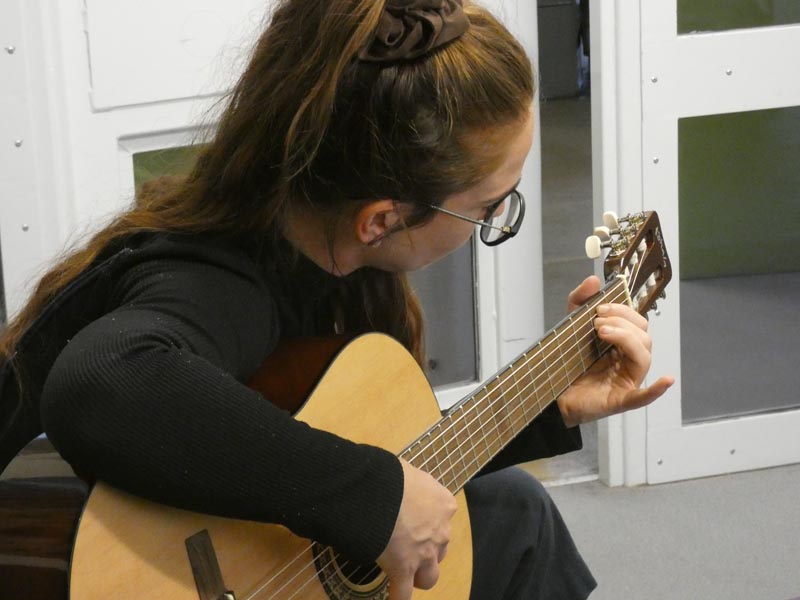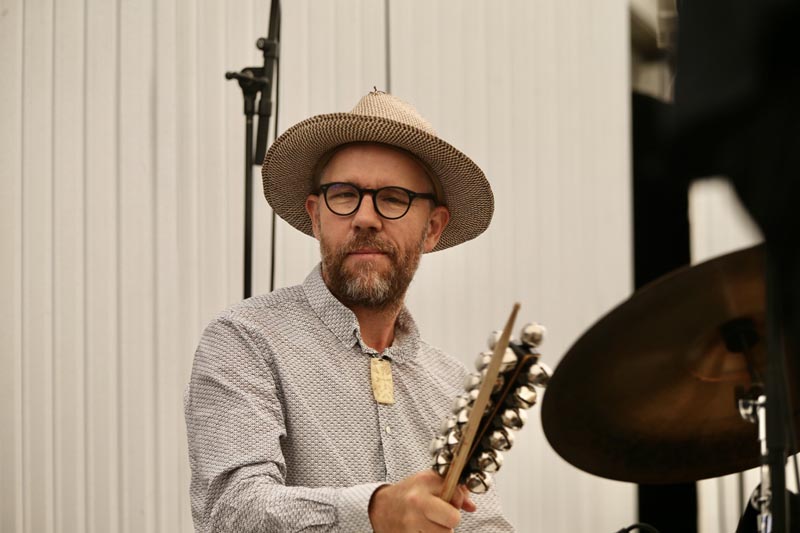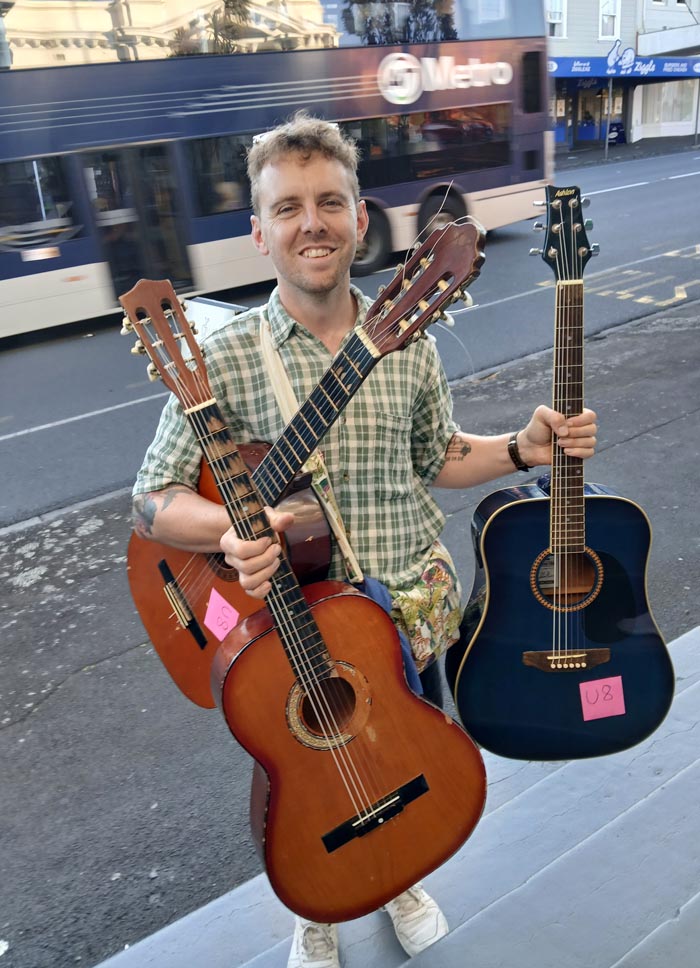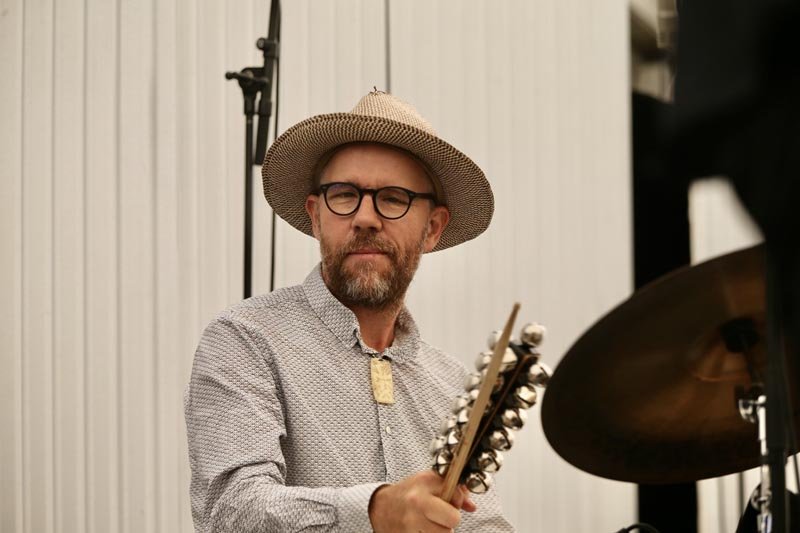“Music brings people together. It bridges cultural gaps, creates instant connection, and lights up the brain in ways we’re only beginning to understand,” says Chris O’Connor, a registered music therapist with more than 20 years of experience as a professional musician, composer and educator.
 INDEX.jpg) In recognition of his contribution, Chris received the Northern Region Arts in Corrections Educator of the Year Award 2025. It was presented by Arts Access Aotearoa at an Arts in Corrections Network hui in Kohuora Auckland South Corrections Facility. Read more about recipients of the Northern Region Arts Awards 2025.
In recognition of his contribution, Chris received the Northern Region Arts in Corrections Educator of the Year Award 2025. It was presented by Arts Access Aotearoa at an Arts in Corrections Network hui in Kohuora Auckland South Corrections Facility. Read more about recipients of the Northern Region Arts Awards 2025.
Chris’s path to music therapy emerged from a lifelong relationship with music – starting with playing drums as a teenager and performing in various bands, then continuing through formal studies in jazz at the Wellington Conservatorium of Music and Ethnomusicology at Victoria University of Wellington.
After two decades of performing, recording, composing and teaching, Chris felt it was time to take a new direction. Drawn to music therapy and its power to foster healing – something he had personally experienced – he pursued a masters degree in the field.
A tool for emotional expression, self-awareness and connection
Now working with the Raukatauri Music Therapy Centre, Chris delivers weekly music therapy sessions at Auckland Prison where he uses music as a tool for emotional expression, self-awareness and connection.
“When I bring music into the prison, my aim is to create an environment of curiosity, openness and mutual respect – essential elements for the music to flourish,” he explains.
“I hold firmly to the principle of treating the men with unconditional positive regard. Simply turning up to the session is enough and I celebrate their presence.”
Manatū Taonga funding of arts programmes in prison
In 2023, Raukatauri Music Therapy Centre was one of 12 organisations, groups or individuals funded through Manatū Taonga Ministry for Culture and Heritage to deliver arts programmes in prisons over a three-year period.
 With the funding, Raukatauri set up a programme in Hawkes Bay Regional Prison delivered by music therapist Ella Polczyk, and a programme in Auckland Prison delivered by Chris O’Connor.
With the funding, Raukatauri set up a programme in Hawkes Bay Regional Prison delivered by music therapist Ella Polczyk, and a programme in Auckland Prison delivered by Chris O’Connor.
His programme began with a few nylon-string guitars, a tambourine, four drums, maracas and basic studio monitors. Over time, it has grown into a dynamic, participant-led space shaped by the group’s energy and needs.
“It’s not about having a plan and sticking to it. Music can emerge spontaneously, depending on what the participants bring to the session,” Chris says. “I might support them with rhythm, improvisation or songwriting. Sometimes it’s just about playing together.”
The men also enjoy listening to requested songs each week and sometimes inspiration is sparked during these listening sessions. Someone will start playing and creating their own piece of music; or they will start singing or dancing, interacting with the music the way they feel it.
 Chris recalls one of many moments that has left a lasting impression on him. During a weekly session, a few of the men were listening to songs they’d requested the previous week, while others were strumming chords on ukuleles or having quiet conversations about music.
Chris recalls one of many moments that has left a lasting impression on him. During a weekly session, a few of the men were listening to songs they’d requested the previous week, while others were strumming chords on ukuleles or having quiet conversations about music.
In the middle of it all, one man approached Chris with a guitar. He’d written a song and wanted to share it.
“Without drawing attention to himself, he sat down in front of me and began to play,” Chris says. “Because the room was gently buzzing with activity, he didn’t feel like all eyes were on him: he could just focus on the music.
“It gave him the space he needed to open up.”
Attendance since the programme started in 2023 has remained consistently strong. For the men who regularly attend, Chris says he witnesses their “growing pride, enthusiasm and openness to learning”.
Music therapy is not just for musicians, he says. The benefits for all participants are wide-ranging. “The men start opening up and accessing parts of themselves they may not otherwise reach in prison – things like creativity, vulnerability, reflection and communication.
“The process gives them insights into being productive and constructive members of the music group – and, by extension, of society.
“For many, it’s the first and only space where these kinds of experiences can be sustained, explored and eventually integrated. The men often use music to express their loss at being separated from loved ones and their remorse for past actions, as well as to articulate aspirations for life beyond prison.”
Wealth of international evidence about music therapy benefits
Chris would like to see music therapy used in prisons as a core component of rehabilitation. He says there’s a wealth of international evidence about its benefits for people in prison.
 Here are just two examples:
Here are just two examples:
- Salvador, A. (2025). A Descriptive Analysis of Music Therapy Research in Correctional Institutions: Trends and Themes (Masters thesis, The Florida State University).
- Whitman, J. R. (2025). The arts of prison cultures: Arts in Criminal Justice and Corrections: International Perspectives on Methods, Journeys, and Challenges, edited by Amanda Gardner and Laura Caulfield, Oxford: Routledge, 2025).
In addition to the music therapy sessions, Chris has launched a community initiative where guitar repair experts volunteer to repair broken guitars in the prison. So far this year, they have repaired a dozen guitars and returned them into the hands of the men in Auckland Prison.
“These guitars become lifelines,” Chris says. “And the people fixing them feel proud knowing where they’re going. It creates an invisible bridge between the community and the men inside.”
Chris says that despite the positive impact of music therapy, the programme now faces an uncertain future with the end of the Manatū Taonga funding.
A grant from the Royston Health Trust means the Hawke's Bay programme can continue for another year. A Creative Communities Scheme grant has enabled the Auckland programme to continue until September. Raukatauri Music Therapy Centre is seeking additional funding to ensure the Auckland programme can continue.



